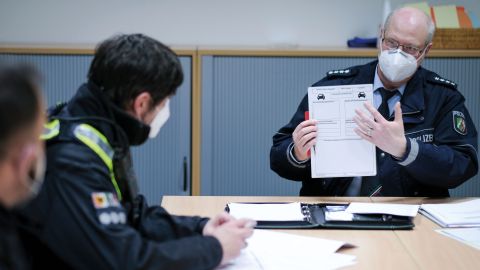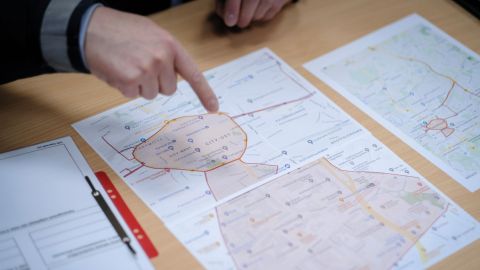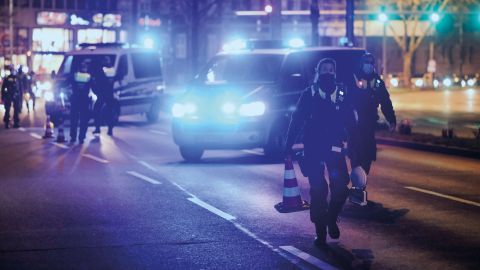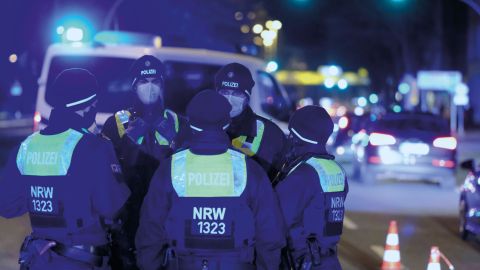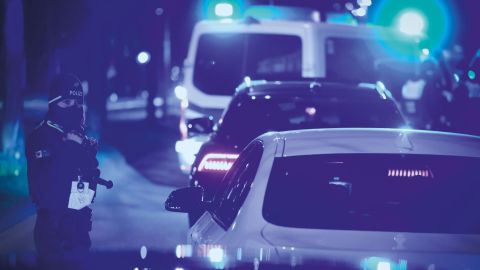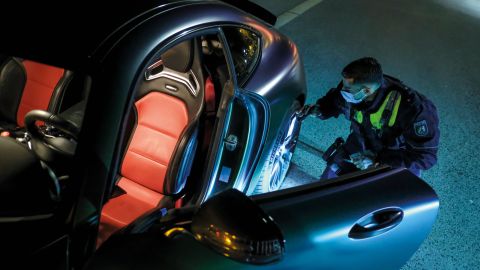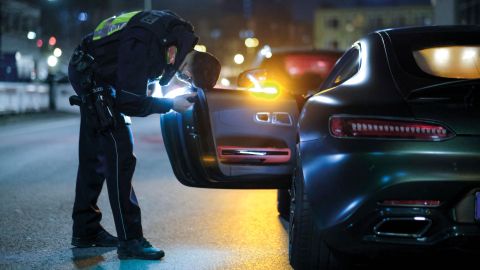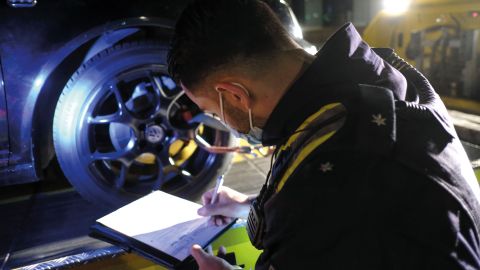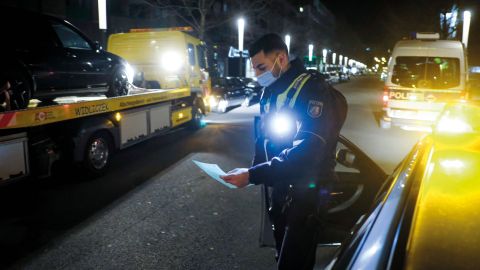On this Friday in March, there will be another priority check in the largest city in Westphalia. It runs under the abbreviation "VKR" for „Verbotene Kraftfahrzeug-Rennen“ ("prohibited motor vehicle racing"). However, speeders are only one problem for the Dortmund police. It is also about ensuring that public traffic space is not misused for a noisy and unauthorized event with tuned cars that are often not roadworthy.
Head of operations Christoph Klinger has summoned his management team to police headquarters at 8.30 p.m. to discuss the planned procedure. In an hour and a half, the operation is due to start, as it has every weekend for months. "The objective is clear," says the police chief inspector. "No room for the scene around the city center."
The area of operation: the Wall, the adjacent area to the south and some access roads. More than 50 colleagues are involved. They come from the two directorates Traffic (V) and Emergency Response/Employment (GE), reinforced by forces from the Hundreds Unit. In order to channel the traffic, the embankment is to be narrowed to one lane and conspicuous vehicles are to be assigned to the mobile posts for inspection. "This will give you a good view of your clientele," announces Klinger, head of the traffic service.
Some tuners consider it super cool to get more engine power out of their cars than is permitted. And if you also tweak the look, you score extra points, especially with female fans. There has long been a strong horsepower scene in Dortmund. A private tuning museum was even opened last year. Serious hobby mechanics and chip optimizers distance themselves from the wild goings-on around the Wall.
Some participants in the weekend rallies keep coming back, have already been sent off and are well known to the police. There have been many complaints, explains the head of operations in an interview with "Streife". Things are gradually calming down. "We get a huge thank you from the people who live in the affected area because they can now sleep with their windows open."
But the 51-year-old officer warns that we must not let up. Presence is still important. "Since the strategic manhunt was approved by the Chief Constable, we can carry out vehicle checks on a case-by-case basis, but regardless of suspicion. Crimes can be prevented this way. That helps." The cars are closely scrutinized and towed away for inspection in the event of suspicious manipulation.
It's not just about disturbing the peace and littering urban areas, Klinger emphasizes. Dortmund has become a magnet. "They come from East Westphalia, the Rhineland, the Sauerland, but also from other federal states." On the way there and back, life-threatening competitions are repeatedly held with the pimped-up sledges. A fortnight ago, for example, boys from Kassel had a race on the highway near Wünneberg-Haaren. "We got a tip by chance and were able to pull them out of here. We have zero tolerance for this kind of behavior."
The city is also involved. It recently introduced a 30 km/h speed limit on the rampart that surrounds Dortmund's historic center. On this evening, the cars slowly push past the police from 10 pm. Some of them have plenty of horsepower under the hood. But a rather harmless-looking Golf is the first to catch the eye.
Police Commissioner Hassan Abo Rashed feels in his element. He has transferred to Directorate V as part of the program to recruit specialists as motor vehicle technicians after completing his police training. The noise from the VW's exhaust seems too loud to him. The 28-year-old takes a sound level meter and sees that he is right. Then he takes a flashlight and discovers fresh grinding marks in the wheel arches, new suspension springs and painted LED tail lights. "That's not a big fish. Nevertheless, it could be quite expensive," he suspects.
The driver of the tuned-up car is quite displeased. The emergency services remain unimpressed. The Golf, which is supposed to look like a GTI, is loaded up. A tow truck takes it to the impound lot. Days later, a thorough inspection confirms the initial suspicion with results that can be used in court. A modified catalytic converter had amplified the exhaust noise. The LED tail lights were not approved for modification, nor were the suspension springs, which lowered the little runabout. The brakes were also not in order. The expert opinion attests to "dangerous defects" and prohibits further driving in this condition.
"Lower, faster, wider" is still the order of the day, remarks train crew leader Frank Bousardt during the center of gravity check. However, the status symbols of the past, such as extreme spoilers, are a thing of the past. In the digital age, electronic methods are chosen to upgrade the car, adds train driver Peer Benneweg.
Chip-tuning can still get a lot out of even a Ferrari, a Mercedes AMG or an S-Class - at the expense of road safety. Specialist Hassan Abo Rashed can often only shake his head. "It's easy to lose control if the individual vehicle parts are not coordinated. Brakes, steering and tires are very critical points," says the police officer with Syrian-Palestinian roots.
In the meantime, Ralf Ziegler, Head of the Traffic Directorate, has arrived at the Wall. He likes to see for himself and regularly visits the operations on Fridays and Saturdays. "Interior Minister Reul has also been here," he says. Because the task force has been involved since the beginning of the year, surveillance is now even more efficient than before. 900 vehicles were driving around here at peak times. "We had to take action."
The successes are already impressive. Some of the scene have apparently moved to suburbs, remote outlying areas and neighboring municipalities. Others are staying right at home. But there is still a considerable number of people who just can't stop. Most of them are not on tour in a luxury model. Jazzing up a car doesn't have to be exorbitantly expensive.
As we are on our way to the "Wash Star", two shiny little cars come towards us on the opposite carriageway. They rock leisurely side by side. The men in the first car have a loudspeaker with them and want to make an appointment with the ladies in the other car. Then they quickly disappear when they register the police. The docking is called "Blechtindern". The main meeting point is on Ostwall - the so-called "Boxengasse".
But it's a dead zone today. When the contact exchange is thriving, the distribution of roles is pretty clear: on folding chairs, the men discuss revs, turbochargers or auxiliary control units with an air of imposing behavior. The women show off their latest outfits and, because it's still cold, try to get close to the warm ventilation shafts. Until it sparks. Or not.
"Wash Star" in the Eving district is - like Lake Phoenix - one of the meeting points outside the city. Hassan Abo Rashed drives there with us in tow. It's after 11 p.m. - we're obviously too late. The car wash is closed. Because of the pink washing foam, which the posers all think is great, they stage themselves here without shyness. Because it's so beautifully garish.
The photos are posted on the Instagram page "Wall Dortmund", which has 18,000 followers. The motifs are posted like trophies.
On this evening, only three 23-year-olds are still standing in the parking lot, undecided. Hassan Abo Rashed checks their identity papers. The trio make no secret of the fact that they belong to the scene. The police commissioner verbally orders them to leave. "The police have ruined our Dortmund. There's nothing going on anywhere anymore," the lads grumble. Then they trot off.
On the way back, the police commissioner, who is familiar with all the technical tricks of the trade, spies a real gem, a cult object for tuners. The green and purple AMG GT is parked on the corner of Schwanenwall/Geschwister-Scholl-Straße. List price around 150,000 euros. Built in 2015, the horsepower monster is probably worth around 250,000 euros due to the extras that are registered in the papers in this case. The driver from Münsterland is an old acquaintance. "What's wrong with you? I only come here twice a month," he says apologetically. The car is registered in his mother's name. Hassan Abo Rashed tells him emphatically that the local residents are being massively inconvenienced by the meetings. Then the police commissioner bends down to the ceramic brakes. "They're already showing small cracks." The AMG driver accepts the police orders without grumbling. He politely says goodbye.
When the police lift the mobile checkpoints shortly before 1 a.m., the hard core gathers - perhaps 30 or 40 vehicles. They circle the embankment once more and start honking their horns. Stall checks are set up immediately and individuals are warned. After that, it's over.
The police report later soberly summarizes what happened: "The police checked 231 vehicles and 278 people on Friday. Very few of them had justifiable reasons for driving across the Wall at night without a destination. The police issued 50 bans. They also confiscated two vehicles. The operating license had expired. With 38 traffic violations, including eleven administrative offenses, some members of the scene were again conspicuous. During additional checks, the officers also discovered eight violations of the Corona Protection Ordinance. Once again, it was not until the last of the scene's vehicles had left the city center, exasperated, that the police ended the control measures. They will continue in the coming months."
PHK Christoph Klinger is satisfied with the operation: "It was nothing major. The scene seems to be gradually retreating." The former water polo player is counting on the staying power of the police.
